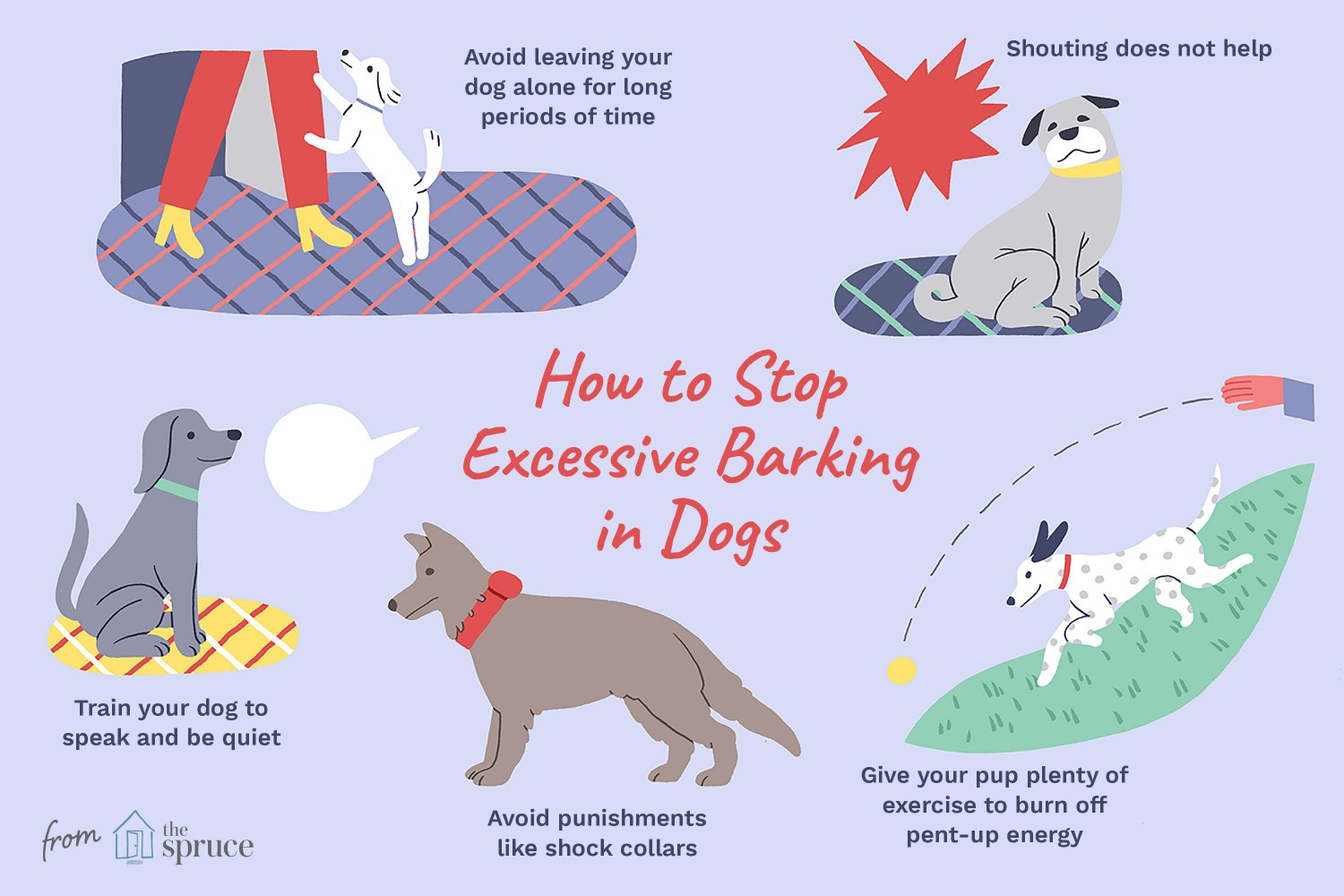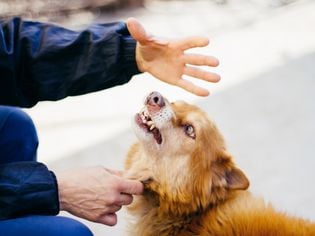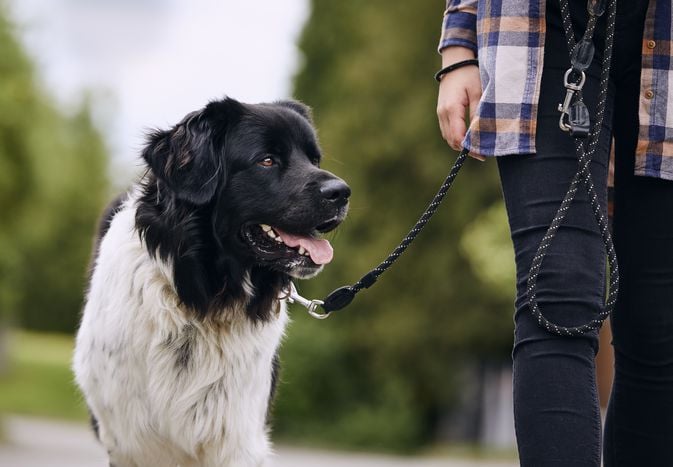Barking is a normal activity for dogs. Dogs will use their bark to express a number of emotions and a bark can mean different things depending on the situation. However, excessive dog barking is a nuisance and can be considered a behavior problem.

The Spruce / Maddy Price
Why Do Dogs Bark Excessively?
There could be several reasons why your dog is barking too much. Although excessive barking is often a behavioral concern, it's always important to rule out health concerns first.
Health Problems
Some dogs bark because they're in pain or have another health issue. Check to see whether your dog has a tender spot somewhere; it may bark if that area is touched. You should have your dog evaluated by your veterinarian as some dogs are good at hiding symptoms of pain, even when you touch them, and sometimes the pain can be in hard to assess areas like their ears or mouth.
Aging Dogs
As dogs age, it's quite common for them to begin to bark more (and make more noise in general). Some aging dogs can begin to excessively bark; some may bark for hours on end, completely unaware of what they are doing. Besides canine cognitive dysfunction, which is similar to Alzheimer's disease, aging dogs can have vision impairments, deafness, or body aches and pains that can lead to barking.
Fear
If your dog is fearful, they may voice this concern via barking. This could take place at home or away and refers to anything that frightens your dog. It could be a person, a loud noise like fireworks, or a strange (or new) situation.
Territorialism
Dogs can become territorial if a new person or dog comes into what they consider their territory. They feel possessive of their area and want to protect it. A dog's territory could range from their home, their yard, or even their bed. If a dog only barks at this situation, this is likely the cause.
Loneliness
Dogs are naturally pack animals, meaning they prefer the company of others. If they're alone for excessive amounts of time, they may bark as a sign of unhappiness. A dog may also long for human company and not just another dog's company. A bored dog or one that isn't getting enough stimulation (both mental and physical), can also bark excessively.
Greeting or Bid for Attention
A greeting bark is usually a friendly bark. It can become a lot when the greeting is given to everyone the dog meets. Excessive barking can signal the dog is hungry, needs to go out, or just wants some attention.
Separation Anxiety
Dogs that do not like to be left alone could be suffering from separation anxiety. In addition to repeated barking, dogs with this condition will usually exhibit other compulsive behaviors such as chewing or scratching furniture, walls, and doors.
How to Stop Excessive Barking
The best way to prevent barking in the first place is to try and remove any potential sources of the behavior. You should also avoid inadvertently encouraging the barking and give your dog better things to do.
To be a good canine citizen, your dog needs to know when to bark and when to be quiet. Part of your job as a dog owner means teaching this to your canine. Start working on problem barking as soon as you can. The longer you wait, the harder it gets to curb the behavior.
It's a good idea to teach your dog the Speak/Quiet Commands, although this may be easier said than done. The goal of these commands is to teach your dog to bark on command and to be quiet on command. It may take weeks for some dogs, so continue the training or work with an expert for extra help. If your dog has been trained and continues to bark too much at certain times, you'll need to understand the cause of this behavior.
Visit the Vet
If the excessive barking behavior is new for your dog, consult your veterinarian to address any health conditions. They will rule out any medical conditions or injuries that could be causing the barking and help you develop an action plan based on your dog's needs. An aging dog that is displaying excessive barking will have different medical needs and an action plan than a young dog. For aging dogs, try to find out the source of the barking.
Behavior Modification
To help stop excessive barking that can be caused by fear, territorialism, loneliness, or attention-seeking, try to pinpoint the exact trigger. If possible, remove that trigger from your dog's life and work on behavior modification training. Start with basic commands, like sit and down in order to shift the focus from barking and reward your dog for good behavior. Give your dog plenty of exercise, so it has less pent-up energy to burn via barking. Mentally stimulating chew toys or puzzle toys are also helpful.
Separation Anxiety
If your dog is suffering from separation anxiety, avoid leaving a lonely dog by itself for long periods of time if possible. Then work with a specialist or find a program that can recondition the dog to separate from its owner. This type of training/retraining can be time-consuming.
What Not to Do
There are a few things to avoid if you have an overly barky dog:
- Never yell at your dog. Not only will it not help to extinguish the behavior, but it may actually stimulate the dog to bark even more.
- Do not hit your dog or use devices like shock collars. This is not only painful and unkind, but some dogs learn to test them and eventually figure out how to work around them.
- Don't let your dog bark constantly when it's outside, regardless of the reason. You can hardly train the dog to stop barking by yelling at it across the yard. Plus, it is one of the fastest ways to turn neighbors into enemies and send an invitation to your local police.
About De-Barking Surgery
"Debarking," or cordectomy is an elective surgical procedure involving partial removal of a dog's vocal cords. Debarking does not take away the dog's ability to bark, it just makes it sound quieter and raspy (which is actually considered annoying by some).
In almost all cases, debarking surgery is unnecessary and unfair to the dog. Surgery and anesthesia are always risks, so any procedure that is purely for human convenience and does not medically benefit the patient or animal community should be avoided.
In addition, excessive barking indicates an underlying issue that is usually behavioral. Surgery takes the noise away, but the anxiety, fear, or similar problem remains unaddressed.
The Role of a Professional
Rather than debarking your dog, spend your time and money on training and/or visiting a veterinary behaviorist to learn how to get your dog to stop barking. This expert will work with you and your dog to help identify the cause of the barking, come up with an action plan to reduce it, and work with you to carry it out. Speak with your veterinarian for a recommendation.
Related Article

Why Do Dogs Eat Grass? A Vet Weighs In
Eating grass is a common behavior in dogs and isn't as concerning as other things dogs try to e

How to Stop Your Dog From Barking Excessively
Barking is a normal activity for dogs. Dogs will use their bark to express a number of emotions and

How to Stop Your Dog From Biting
Dogs are everywhere, so preventing dog bites is a necessity. Although some dogs are friendlier than

Help Your Dog Get Over Its Fear of Strangers
Some dogs are scared of people, and some suffer extreme fear of strangers. They cower, tremble, and

Top 10 Basic Dog Training Commands
While training your dog, it's important to spend time teaching your dog certain actions.

Socializing Your New Dog Is So ImportantâHereâs How To Do It
Dog socialization is an essential part of raising a puppy into a happy, well-adjusted adult. Onc

8 Things to Teach Your New Rescue Dog Right Away
Once you've decided that a dog is right for you and have welcomed them into your home, it’s essen

7 Special Ways to Remember Your Pet
Losing a beloved animal companion is one of the most difficult things a pet parent can go through.
About Ask a Paw
We are a premier digital platform committed to delivering high-quality content to our readers. Our mission is to provide accurate, reliable, and engaging information that adds value to our audience's daily lives.
Our team consists of experienced content creators and subject matter experts who uphold the highest standards of professionalism. In an era of information overload, we curate content with care, ensuring our users receive only the most relevant and trustworthy information.
Beyond just reporting facts, we focus on depth and context. Through expert analysis, comprehensive research, and clear presentation, we help our audience gain meaningful insights and make informed decisions.
We take pride in being a trusted information source for our growing community of readers. Our user-first approach means we continuously adapt to provide content that meets our audience's evolving needs and interests.
Innovation and excellence drive everything we do. We're committed to improving our platform and services to deliver the best possible experience for our users.

Comments on " How to Stop Your Dog From Barking Excessively" :